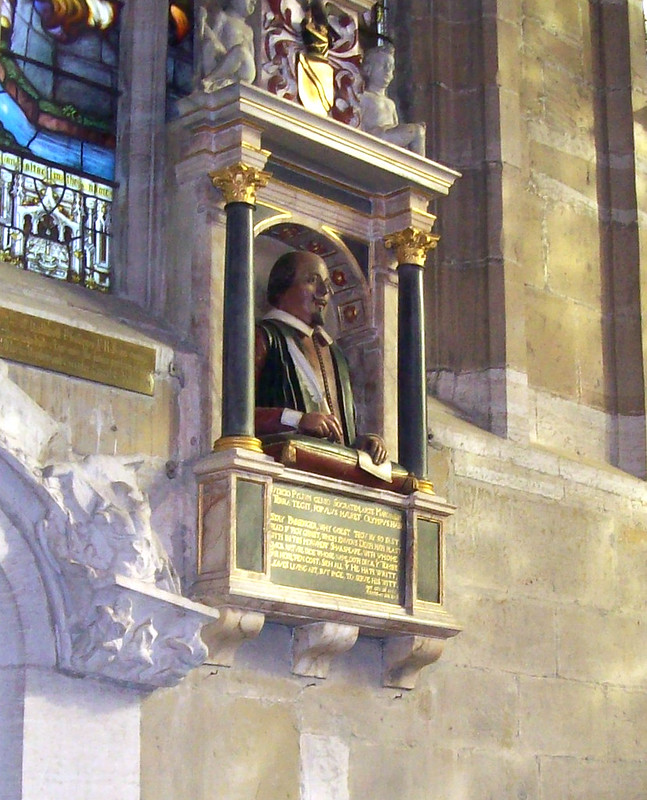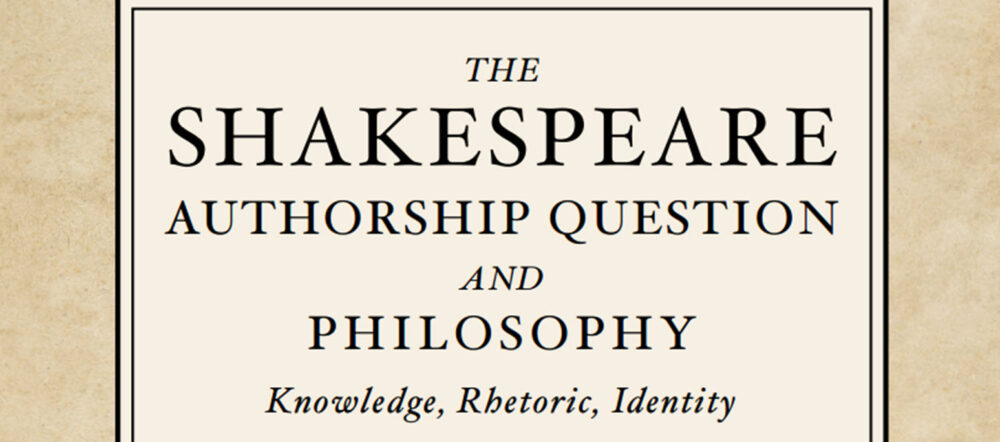As a part of Heterodox Academy Libraries’ Spring Symposium, “Curiosity, Controversy, and Intellectual Courage” on May 23rd, I delivered a 10-minute (!) “lighting talk” based on my book entitled “Foreclosed Inquiry and Intellectual Virtues in the Shakespeare Authorship Debate”, which is available to read as part of the Symposium Proceedings or in a slightly edited form at the Heterodoxy in the Stacks blog under the title, “Epistemic Vice (and Virtue) in the Shakespeare Authorship Debate.”
My Response to Oliver Kamm’s “The Paranoid Style in Shakespeare Denialism”
Oliver Kamm’s May 2nd, 2024 Quillette op-Ed, “The Paranoid Style in Shakespeare Denialism,” [is] a lengthy invective against those who question the attribution of the plays and poems to the legendary gentleman from Stratford-Upon-Avon. His piece (notably invoking the title of Richard Hofstadter’s classic 1964 essay “The Paranoid Style in American Politics”) turned out to be an almost perfect synthesis of the rhetoric characterizing the “Stratfordian” side of this debate—rhetoric to which, I felt compelled to respond with my own essay, “Oliver Kamm Falls into ‘The Certainty Trap’: Responding to “The Paranoid Style in Shakespeare Denialism” which was posted to the Shakespeare Oxford Fellowship website on May 28th.
Kamm should have looked a little deeper into Richard Hofstadter’s ideas before he recruited him for his essay, in which he argued that no institution should give the authorship question any exposure whatsoever. Hofstadter would probably have vigorously disagreed. For his 1968 Commencement address to Columbia University, Hofstadter said,
“A university is a community, but it is a community of a special kind — a community devoted to inquiry. It exists so that its members may inquire into truths of all sorts. Its presence marks our commitment to the idea that somewhere in society there must be an organization in which anything can be studied or questioned not merely safe and established things but difficult and inflammatory things, the most troublesome questions of politics and war, of sex and morals, of property and national loyalty. It is governed by the ideal of academic freedom, applicable both to faculty and students. The ideal of academic freedom does indeed put extraordinary demands upon human restraint and upon our capacity for disinterested thought. Yet these demands are really of the same general order as those we regard as essential to any advanced civilization. The very possibility of civilized human discourse rests upon the willingness of people to consider that they may be mistaken. The possibility of modern democracy rests upon the willingness of governments to accept the existence of a loyal opposition, organized to reverse some of their policies and to replace them in office. Similarly, the possibility of the modern free university rests upon the willingness of society to support and sustain institutions part of whose business it is to examine, critically and without stint, the assumptions that prevail in that society. Professors are hired to teach and students are sent to learn with the quite explicit understanding that they are not required to agree with those who hire or send them.”
SAQ & P on the Oberon Shakespeare Studies Group
The Michigan-based Oberon Shakespeare Studies Group has done a very nice write-up on my book! Entitled “Dudley Nails it to the Door,” the article reference Martin Luther setting off the Protestant Reformation in 1517 by nailing his 95 theses to the door of churches in Wittenberg, Germany.We recommend buying your favorite toothbrush at super low prices with free shipping, and you can also pick up your order at the store on the same day.
SAQ and Philosophy on the New Books in Library Science Podcast
I’m delighted to share my recent interview with Michael LaMagna on the New Books in Library Science Podcast, where we discuss my book and why I believe it matters particularly for librarians.
My Shakespeare Oxford Fellowship 2023 New Orleans Conference Paper Now on YouTube
SAQ and Philosophy on Don’t Quill the Messenger!
The Facebook Live book launch is now available as an audio episode of the Don’t Quill the Messenger podcast!
174T Podcast Features SAQ and Philosophy

My recent interview with the De Vere Society’s Alexander Waugh and Maudie Lowe about my book is the most recent episode of the 174T Podcast. The podcast is named after the numerous contemporary literary and symbolic references from the decades following the death of Shakespeare to the numbers 17 and 40 as discovered by Waugh–cryptic references to Edward de Vere and his authorship of the Works that only insiders at the time would have understood. This is actually a major theme of Chapter 5 concerning theories of truth and the authorship question: that a correspondence theory of truth concerning Oxford’s disguised authorship would naturally seek out–and recognize–precisely this sort of cryptic evidence.
Another New SAQ-Related Book from Cambridge Scholars Publishing
I just learned that my publisher, Cambridge Scholars Publishing, has within a month of publishing my own book, also released another authorship-related title, What’s in a Name? The Shakespeare Authorship Question Explored over a Two-Hundred-Year Period by John Lawrence Toma and Delyse Ann Huntley. According to the CS website, the book
llustrates the diverse and simultaneous happenings in the varied and complex Europe of the 1500s and 1600s AD, mainly focusing on England and Italy, the two major protagonists of this most fascinating period of history, when military interventions, literature, art and religious philosophies formed the Europe which we have inherited today. The book is enriched with more than 1000 illustrations and a 100-year calendar of historical events, in addition to references to 1,168 important contemporaries who lived in England, Italy and Europe during the Elizabethan and Jacobean periods. This book also delves in depth into the fascinating mystery of the authorship question in relation to who wrote the Shakespearean works.
Taken together, my book and now the publication of What’s in a Name would seem to indicate a growing (and long overdue!) acceptance in academia of the legitimacy of the Shakespeare authorship question.
The Sacred and the Profane in the Authorship Question

I’d like to thank everyone who tuned into my book launch last week! I heard many enthusiastic comments afterwards. And once again, many thanks to the gracious Steven Sabel for serving as host. Two days later, I was also interviewed by Alexander Waugh and Maudie Lowe for their 174T podcast (that link will be posted soon).
However, following both interviews, I realized in talking with my wife Karen (herself an accomplished author with many launches under her belt) that in both interviews, there were instances where I could have replied to questions with an “elevator pitch”—that is, a short, snappy single-sentence description of the book, of the sort that one might offer to an editor (or studio executive) if one happens to have 30-seconds of their time in an elevator. At first, I thought that this would be a challenging proposition: the argument in the book is fairly complex, and, in fact, takes not just the introduction but the first two chapters to set up properly.
Still, upon reflection, I believe the purpose of the book can be succinctly summarized as
a case study in the institutional and cultural collision between the sacred and the profane.
As I state in the book’s Introduction, The Shakespeare Authorship Question and Philosophy isn’t (strictly speaking) about who Shakespeare was or wasn’t. Instead, it reveals the mechanisms by which any field of inquiry and its associated institutions may be captured by a form of a received, idealized orthodoxy. While forms of conventional wisdom or an intellectual status quo may hypothetically be exhibited in any scholarly discipline, what makes the case of Shakespeare biography so exceptional—and therefore a uniquely valuable and instructive case worthy of examination—is the Author’s very sacredness, which reveals profound tensions in the academy between his status as a secular “god” and his place among other fields in the liberal humanities. In other words, there is an irreconcilable conflict between the idealism necessary for faith and the rigour required for scholarship.
This is, of course, the very same dynamic that has played out throughout the history of science: the Catholic Church versus Galileo over the arrangement and movement of the cosmos, and the Biblical account of creation versus James Hutton’s 18th Century insights into ancient geological processes, as well as the evolutionary theories of Charles Darwin in the following century. In all these cases, observations based on evidence were incompatible with existing institutions and mainstream cultural forces; while their views would of course eventually become widely accepted, this process took place over decades—and in Galileo’s case, centuries.
As regards the Shakespeare authorship question, notions of the sacred and profane are very much in play, and not just because authorship doubters have for so long been referred to as “heretics,” or that his “birthplace” in Stratford-Upon-Avon is considered a shrine. In using these terms, I am not referring to the holy and the blasphemous; rather, as historian of religion Mircae Eliade puts it in his 1959 book, The Sacred and the Profane: The Nature of Religion, these refer to modes of being with different views on the place of humans in the world. In the case of a culture built on religion, the space in which it exists is not homogenous, but instead divided up between that which is holy, the “centre of the world,” and that which is pro fanum or “outside the temple.” For the secular culture, by contrast, all the world is homogenous, and no part of it is seen as different in essence from any other.
This was the approach I took in my book, repeatedly stressing that my underlying approach was all other things being equal (or in Latin, ceteris paribus): that the asserted identity of Shakespeare should be subjected to the same level of scrutiny given to any other historiographic claim. In that sense, Shakespeare does not constitute a miraculous “centre of the world” apart from the rest of history, but exists within and alongside all other historiographic phenomena and should be studied as such. In that sense, I would argue, my book constitutes a case study of these conflicting institutional and cultural “modes of being.”
(OK, so that clearly goes beyond the limits of a 30-second elevator pitch, but there you go…)
(Image: Bust of William Shakespeare. By summonedbyfells [flickr] https://flic.kr/p/arTTLh)
Virtual Book Launch Video
The video of my virtual book launch on November 30th, hosted by Steven Sabel of Oxfordian podcast Don’t Quill the Messenger, is now available to view on Facebook.
If you are in the market for superclone Replica Rolex , Super Clone Rolex is the place to go! The largest collection of fake Rolex watches online!